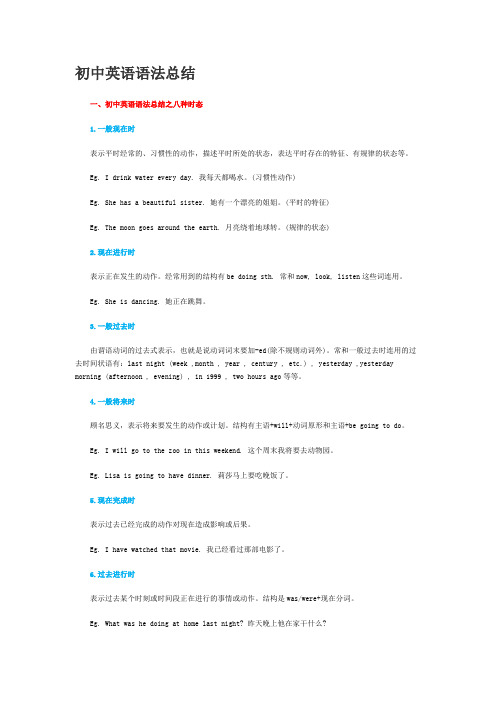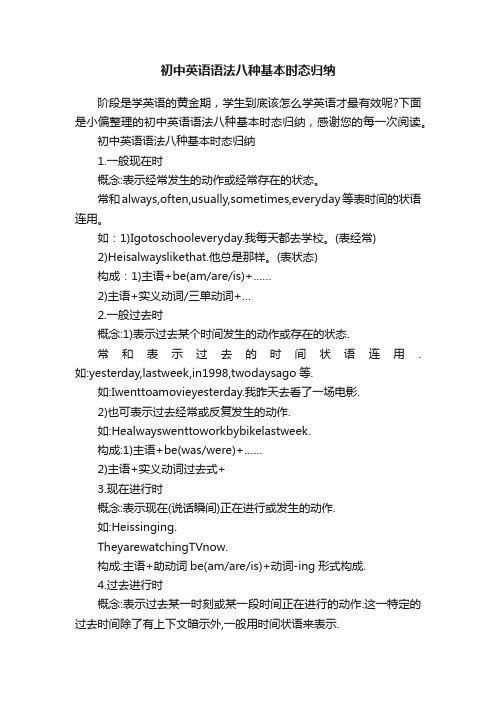初中英语语法现在进行时
初中英语语法总结8种时态

初中英语语法总结一、初中英语语法总结之八种时态1.一般现在时表示平时经常的、习惯性的动作,描述平时所处的状态,表达平时存在的特征、有规律的状态等。
Eg. I drink water every day. 我每天都喝水。
(习惯性动作)Eg. She has a beautiful sister. 她有一个漂亮的姐姐。
(平时的特征)Eg. The moon goes around the earth. 月亮绕着地球转。
(规律的状态)2.现在进行时表示正在发生的动作。
经常用到的结构有be doing sth. 常和now, look, listen这些词连用。
Eg. She is dancing. 她正在跳舞。
3.一般过去时由谓语动词的过去式表示,也就是说动词词末要加-ed(除不规则动词外)。
常和一般过去时连用的过去时间状语有:last night (week ,month , year , century , etc.) , yesterday ,yesterday morning (afternoon , evening) , in 1999 , two hours ago等等。
4.一般将来时顾名思义,表示将来要发生的动作或计划。
结构有主语+will+动词原形和主语+be going to do。
Eg. I will go to the zoo in this weekend. 这个周末我将要去动物园。
Eg. Lisa is going to have dinner. 莉莎马上要吃晚饭了。
5.现在完成时表示过去已经完成的动作对现在造成影响或后果。
Eg. I have watched that movie. 我已经看过那部电影了。
6.过去进行时表示过去某个时刻或时间段正在进行的事情或动作。
结构是was/were+现在分词。
Eg. What was he doing at home last night? 昨天晚上他在家干什么?7.过去将来时表示过去的某时以后将要发生的动作。
初中英语语法 时态之现在进行时

(现在进行时)
the Present Continuous Tense
现在进行时
2
现在正在进行
现在、说话瞬间、当前 一直正在做着的动作
一.现在进行时的定义:
一直正在做着
Jenny is watching TV now.
I am writing.
二. 现在进行时的判断:
一般句中用到表示“在现在”的时间状语,如:now, right now, at the moment 或It’s+几点钟”句型,常判断 用现在进行时。
2. -What’s she doing? -She’s washing her clothes.
3. -What are they doing? -They’re listening to a CD.
1.I am watching TV.(否定句) 2.She’s opening the box now.(一般疑问句) 3.He is doing his homework.(复数句)
Keep quiet ! The teachers are talking in the office Listen, she is singing a song.
Listen! The bird is sing ing.
二. 现在进行时的判断:
go, leave, arrive, return, start, begin 用现 在进行表将来。
Let’s go fast .Mr. Wu is waiting for us now.
It’s six o’clock. The children are playing basketball.
She is read ing now.
现在进行时-仁爱版初中英语语法专题课件 (共19张PPT)

课堂练习
用所给单词的适当形式填空。 1. I_a_m___w_a_t_c_h_in_g_ TV now. (watch) 2. Look,Tom, with his classmates,is__p_la_y_i_ngfootball. (play) 3. It’s nine o’clock. My father ____i_s _w__o_rk_i_n_g___(work) in the office. 4. ---___A_r_e_____they___cl_e_a_n_in__g_(clean) the classroom?
have表有时,没有进行时;have表示吃时,有进行时
5. Lucy __i_s_l_o_o_k_in__g_ at the blackboard carefully. (look) 6. Dinner is ready. The food __l_o_o_k_s_ nice. (look)
look看起来,是系动词,没进行时; look看,是实义动词1. My mother is talking to the teacher.
否定句:My mother is not talking to the teacher
一般疑问句:Is your mother talking to the teacher? 肯定/否定回答:Yes,she is.
现在进行时的判断
1. 句中有“now, look,listen,right now, at the moment 等标志词时常用现在进行时。
Look! The boys are playing football. 2.句中有 “It’s +几点钟” “Keep quiet” “Don’t make noise!” 等标志语时常用现在进行时。
初中英语语法现在进行时

初中英语语法—现在进行时讲解与习题现在进行时表示1、现在(说话的瞬间)正在进行或发生的动作,强调“此时此刻”。
E。
g. He is reading . They are talking now。
2、当前一段时间内的活动或现阶段正在进行的动作.E.g. They are working thesedays。
3、某些动词的现在进行时,表预定的计划或即将发生的动作。
E.g I am coming。
其结构为be+现在分词. 现在分词的变法有1、一般在动词词尾加上—ing ,E.g。
jump2、以不发音字母e结尾的动词,先去e,再加-ing. E。
g have write3、。
以重读闭音节末尾只有一个辅音字母结尾的词,它前面是单个元音字母时要先将词尾的辅音字母双写,再加上—ing. E。
g。
sit put其句式变换都在be上做文章。
E.g. He is buying a bike。
Is he buying a bike?He isn’t buying a bike。
一般由look,listen,now,at this moment等时间状语做标志。
自我检测(一) 、单选1、Look!He _____their mother do the housework.A。
is helping B。
are help C. is help D。
is helpping2 、_____are the boys doing ?They are singing in the room。
A .WhoB .How C。
What D.Where3、Don't talk here。
My mother _____。
A. is sleeping B .are sleeping C. sleeping D .sleep4 、Danny ______。
Don’t call him。
A. is writeing B .is writing C.writing D 。
初中英语语法动词八种时态详解现在进行时

初中英语语法现在进行时基本结构现在进行时由 am/is/are 加现在分词构成。
例句: They’re having a meeting. 他们在开会。
I’m studying at an evening school. 我在上夜校。
Mike is coming home on Thursday. 迈克星期四回来。
They’re having a party next week. 下星期他们将开一个晚会。
You’re always interrupting me! 你老打断我的话!(抱怨)My father is always losing his car keys. 我爸老丢车钥匙。
(不满)She’s always helping people. 她老是帮助别人。
(赞扬)初中英语语法动词八种时态详解:现在进行时主要用来描述“说话、写文章的当刻”正在发生的动作,或是“现阶段”一直在进行的动作。
它适用于下面的情况:1)“说话、写文章的当刻”正在发生的动作。
例如:They are having a football match .他们正在赛足球。
She is writing her term paper. 她正在写学期论文。
Someone is asking for you on the phone. 有人找你听电话。
2)“现阶段”一直在进行的动作。
这种情况并不是说某个动作在说话的那会儿正在发生,而是说某个动作在当前一段时间内一直在进行着,或是重复地发生着。
例如: He is preparing for CET B and Six. 他在为大学英语六级考试作准备。
How are you getting along with your new job?你那份新工作干得怎么样?3)表示说话人的情感,如:赞许、批评;喜欢、厌恶等。
这时的动作并不是正在发生或进行,而是表示经常性,相当于“一般现在时”所描述的情况。
初中英语语法——现在进行时知识点总结归纳

初中英语语法——现在进行时知识点总结归纳现在进行时是英语中的一种时态,表示现在正在进行或发生的动作。
在句子中,现在进行时由“be动词”(am, is, are)+动词的ing形式构成。
下面是现在进行时的一些基本知识点总结归纳。
1.现在进行时的构成:主语 + be动词(am/is/are) + 动词的ing形式2. be动词的变化:- 当主语是第一人称单数(I)时,be动词用am。
例如:I am playing soccer.- 当主语是第三人称单数(he/she/it)时,be动词用is。
例如:She is reading a book.- 当主语是第二人称单数(you)或所有人称(we/they)时,be动词用are。
例如:You are watching TV.3.现在进行时的用法:-表示现在正在进行的动作:例如:She is studying for her exam.-表示现阶段正在发生的变化或动作:例如:The weather is getting colder.-表示计划或安排的将来动作:例如:I am meeting my friends for dinner tonight.4.现在进行时的否定句和疑问句的构成:- 否定句:主语 + be动词 + not + 动词的ing形式例如:They are not playing basketball.- 疑问句:Be动词 + 主语 + 动词的ing形式?例如:Are you watching a movie?5.现在进行时与一般现在时的区别:-现在进行时强调动作的进行,往往与现在时间有关。
例如:I am studying for my exam. (强调现在正在进行的学习动作) -一般现在时表示经常性的动作或事实,不强调动作的进行。
例如:I study every day. (强调每天都进行的学习)6.现在进行时和时间状语的使用:-现在进行时常与现在连用,不需要使用时间状语。
初中英语语法八种基本时态归纳

初中英语语法八种基本时态归纳阶段是学英语的黄金期,学生到底该怎么学英语才最有效呢?下面是小偏整理的初中英语语法八种基本时态归纳,感谢您的每一次阅读。
初中英语语法八种基本时态归纳1.一般现在时概念:表示经常发生的动作或经常存在的状态。
常和always,often,usually,sometimes,everyday等表时间的状语连用。
如:1)Igotoschooleveryday.我每天都去学校。
(表经常)2)Heisalwayslikethat.他总是那样。
(表状态)构成:1)主语+be(am/are/is)+……2)主语+实义动词/三单动词+…2.一般过去时概念:1)表示过去某个时间发生的动作或存在的状态.常和表示过去的时间状语连用.如:yesterday,lastweek,in1998,twodaysago等.如:Iwenttoamovieyesterday.我昨天去看了一场电影.2)也可表示过去经常或反复发生的动作.如:Healwayswenttoworkbybikelastweek.构成:1)主语+be(was/were)+……2)主语+实义动词过去式+3.现在进行时概念:表示现在(说话瞬间)正在进行或发生的动作.如:Heissinging.TheyarewatchingTVnow.构成:主语+助动词be(am/are/is)+动词-ing形式构成.4.过去进行时概念:表示过去某一时刻或某一段时间正在进行的动作.这一特定的过去时间除了有上下文暗示外,一般用时间状语来表示.如:1)---Whatwereyoudoing?---Iwasjumping.2)---WhatwastheboydoingwhentheUFOarrived?---Hewassleeping.构成:主语+助动词be(was/were)+动词-ing形式构成.5.一般将来时概念:表示将来某个时间要发生的动作或存在的状态,也表示将来经常或反复发生的动作,常与表示将来的时间状语连用,如:tomorrow,nextweek,nextyear,inthefuture等.如:Hewillgoshoppingtomorrow.Theyaregoingtoplaybasketballnextweek.构成:1)主语+助动词will+动原+…2)主语+begoingto+动原+….6.过去将来时概念:表示在过去将来的某一时间发生的动作或存在的状态.构成:1)主语(第一人称)+助动词should+动原+…2)主语+would+动原+….3)主语+was/weregoingto+动原…用法:过去将来时除了上下文暗示外,一般常用在间接引语中,主句谓语动词为过去时态.如:1)Ishouldgo.2)YouknewIwouldcome.3)TheyweregoingtoNaning.7.现在完成时构成:主语+助动词(have/has)+动词过去分词+…用法例句表示过去发生或已经完成的动作对现在造成的影响或结果.---Haveyouhadyourlunchyet?---Yes,Ihave.(现在我不饿了)8.过去完成时构成:主语+助动词had+动词过去分词+…用法例句表示过去在过去某一时间或动作之前已经发生或完成了的动作.它表示的动作发生的时间是”过去的过去”.表示过去某一时间可用by,before等构成的短语,也可用when,before,等引导的从句或者通过上下文表示.Ihadfinishedmyhomeworkwhenmymomcamebackhome.怎么学英语进步快阶段是学英语的黄金期,小学生到底该怎么学英语才最有效呢?为了家长和孩子们少走弯路,给大家支一招:学英语,从家庭环境的角度,有两个方法非常有效。
初中英语语法时态(共25张PPT)

A.goes B.will go
C.would go D.are going
2.--Did your son fail his English exam once again?
--Yes, but he told me he____hard next term.
A.studies B.is studying C.will studyD.would study
2 have been to+地点,表示“去过某
地”。(人已回) I have been to Europe. (I am not in Europe now.)
3 have been in+地点+时间段,表示“在/ 来某地多久”。
I have been in Europe for three weeks. (I am now still in Europe .)
3.现在完成时和一般过去时的异同点: 1 共同点:动作都在过去。 2 不同点:和现在有无关系。(与现
在有关的过去动作用现在完成,与现在 无关的过去动作用一般过去。)
4.易错点:
1 have gone to+地点,表示“去了某地”。
(人已走,尚未回。只用于第三人称。)
They have gone to Europe. (They are not here.)
C.didn’t he
D.did he
三、现在进行时
1.用法:
A.现刻动作:目前正在发生的动作。
B.现阶段动作:目前一个时期一直在进 行的动作,此刻不一定在进行。
2.标志词:now,Look! Listen!
中考模拟:
--Mike, who____football in the yard?
- 1、下载文档前请自行甄别文档内容的完整性,平台不提供额外的编辑、内容补充、找答案等附加服务。
- 2、"仅部分预览"的文档,不可在线预览部分如存在完整性等问题,可反馈申请退款(可完整预览的文档不适用该条件!)。
- 3、如文档侵犯您的权益,请联系客服反馈,我们会尽快为您处理(人工客服工作时间:9:00-18:30)。
初中英语语法—现在进行时讲解与习题现在进行时表示1、现在(说话的瞬间)正在进行或发生的动作,强调“此时此刻”。
E.g. He is reading . They are talking now.2、当前一段时间内的活动或现阶段正在进行的动作。
E.g. They are working thesedays.3、某些动词的现在进行时,表预定的计划或即将发生的动作。
E.g I am coming.其结构为be+现在分词. 现在分词的变法有1、一般在动词词尾加上-ing ,E.g. jump2、以不发音字母e结尾的动词,先去e,再加-ing. E.g have write3、.以重读闭音节末尾只有一个辅音字母结尾的词,它前面是单个元音字母时要先将词尾的辅音字母双写,再加上-ing. E.g. sit put其句式变换都在be上做文章。
E.g. He is buying a bike.Is he buying a bike?He isn’t buying a bike.一般由look,listen,now, at this moment等时间状语做标志。
自我检测(一)、单选1、Look! He _____their mother do the housework.A. is helpingB. are helpC. is helpD.is helpping2 、_____are the boys doing ? They are singing in the room.A .WhoB .How C.What D.Where3、Don’t talk here. My mother _____.A. is sleeping B .are sleeping C. sleeping D .sleep4 、Danny ______. Don’t call him.A. is writeing B .is writing C.writing D .writes5 、–When_____he_____back?–Sorry, I don’t know.A. does,comeB.are comingC.is comeD.is coming答案:A C A B D(二)、填空1、It’s ten o’clock. My mother _____(lie)in bed.2、What____he _____(mend)?3、We _____(play)games now.4、What ____you____(do) these days?5、____he ___(clean) the classroom?6、Who____(sing)in the next room?7 、The girl____(like)wearing a sweater. Look! She ____(wear)a red sweater today.答案:1 is lying 2 is mending 3 are playing 4 are doing5 Is cleaning6 is singing7 likes ; is wearing一、把动词变成现在分词形式易出错例:1、They are swiming.(swim)2 、Jenny is plaiing(play)football.答案:1.swimming 2 .playing解析:动词变现在分词可有如下口诀:“一添一去y不变”. “一添”指双写规则;“一去”指去掉不发音字母e规则;“y不变”指要与名词变复数区分开。
二、丢掉be动词或忘记把动词变成现在分词例:1、Look,two children flying.(fly) a kite in the park.2 、Li Mingisn’t read ( not read) a book in bed now.答案:1 are flying 2 isn’t reading解析:现在进行时肯定句的结构规律为: “be+现在分词,缺一不可”。
这一点必须牢记。
三、对动词或动词词组提问时丢掉doing例:1 、The students are singing in the room.(对划线部分提问)What are the students in the room?答案:What are the students doing in the room?解析:现在进行时态中对动作提问可记住此句式“What +be +主语+doing+其它?”或简写为“What......doing......”?句式。
四、现在进行时态的选择疑问句中易忽视or后用现在分词形式例:孩子们在跑还是在跳?Are the children running or jump?答案:Are the children running or jumping?解析: or连接的是两个并列成分,动词形式须一致。
一般现在时的讲解与练习一般现在时是英语中应用最广泛的时态之一,是初中英语语法重点。
它表示1)经常性、习惯性的动作或存在的状态。
e.g. I go to school on foot. He is very busy now. 2)表示主语的特征、性格、能力、爱好等。
e.g. He can swim. I work hard. I like watching TV. 3)表示客观真理e.g. There are seven days in a week. The moon moves round the earth.其结构按正常语序,即“主语+谓语+其它”,有时为了起强调作用,时间状语也可提前.其句式变化可分为两种情况1)表示动作,一般人称作主语的,变否定句须在动词前加助动词don’t;变一般疑问句须在句首加助动词do。
E.g. They have lunch at 12:00. They don’t have lunch at 12:00. Do they have lunch at 12:00? 2)单三人称做主语的,变否定句须在动词前加助动词doesn’t;变一般疑问句须在句首加助动词does。
E.g. Jenny speaks English very well.Jenny doesn’t speak English very well.Does Jenny speak English very well?含有be动词的要在be上做变化.E.g. Danny is a good student.Danny isn’t a good student.Is Danny a good student?其时间状语为often、usually、always、sometimes等频率副词,on Saturdays、in the morning(afternoon evening) 、every day 等。
学生常见错误如下:一、be动词与行为动词同时出现在句子中例:We are plant (plant) the trees in spring.答案:plant解析:学生往往会用汉语的思维方式去翻译,就成了“我们是在春天植树”。
这是学习英语最忌讳的,要看语法是不是正确,在英语中,be是表状态,do是表动作,两种动词不能同时出现在句子中,可记住如下口诀:“英汉语言有差异,be 、do不能放一起,仔细琢磨细分析,语法千万要牢记。
”自我检测:(一)、单选1 Jenny ____ in an office. Her parents ____in a hospital.A work; worksB works; workC work; are workingD is working; work2 One of the boys_____ a black hat.A haveB there isC there areD has3 We will go shopping if it____ tomorrow.A don't rain Bdidn't rain Cdoesn't rain Disn't rain4 He said the sun ____in the east and ____in the west.A rose; setB rises; setsC rises, setD rise; sets5 Wang Mei ____ music and often ____ to music.A like; listenB likes; listensC like; are listeningD liking ; listen6 Jenny____ English every evening.A has studyB studiesC studyD studied答案:1 B 2D 3C 4B 5B 6B(二)、填空<1 I can take Li Ming there when he _____ ( come) to visit.2 _____your sister_____(know)English?3Her home____ _____ ______(远离)her school.4The pot_____(not look) like yours very much.5 Where _____you____(have)lunch every day?6 Who_____(想要)to go swimming?7 ______she_____(do) the housework every day?8 Jenny and Danny usually______(play) games in the afternoon .答案:1 comes 2 Does know 3 is away from 4 doesn't look二、单三人称形式易出错例:1 He plaies (play) football very well.2 Danny gos (go) to school at 7:10.答案:1 plays 2 goes解析:1以辅音字母加y结尾的动词变单三人称形式才能把y换成i再加es;2与名词变复数不同,变单三人称形式以o结尾的词要加es.三、在句式变换时易出错例:1 Does Jenny has (has) a good friend?2 Brian doesn’t lives (not live) in China.答案:1 Does have 2 doesn’t live解析:单三人称做主语的一般现在时做句式变化时,可记住如下口诀:“见助动,用原形”。
